
Life often throws curveballs, sometimes all at once, creating moments when survival feels like a juggling act: this was such a moment.
It was a Friday evening, and I was shooting a television segment in Sydney for New Zealand TV about the Australian dating app voluntary code. My expertise in dating apps and intimacy, built through years of research and a PhD, has brought me here—a great opportunity to share insights on a topic I'm deeply passionate about.
But I wasn't well. For weeks, I'd battled relentless sinusitis, exhaustion, and a persistent upper respiratory infection. As I powered through the interview, I felt a sudden snap, crackle, and pop in my ear. Warm fluid streamed out, and while I hoped it wasn't visible on camera, I suspected I had ruptured my eardrum. Far from ideal. The videographer assured me it wasn't noticeable, but a trip to the emergency room confirmed my fears.
Watch: Here's how you can encourage your kids to be healthy. Post continues after video.
Saturday brought vertigo so intense I could barely stand. By Sunday, my focus shifted when my son's fever spiked dangerously above 40°C. Another trip to the hospital revealed two nasty viruses.




























































































